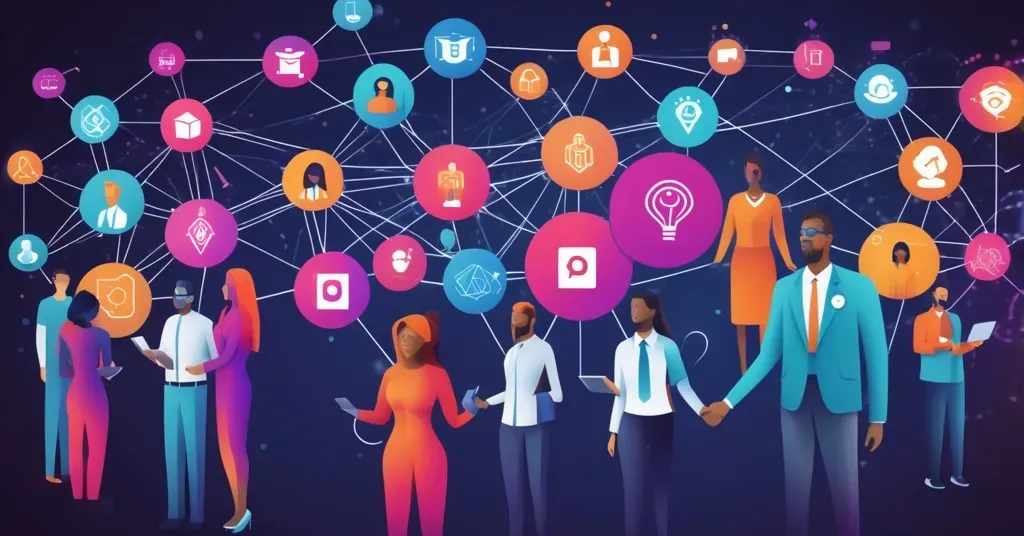
Unlocking ExOs: Social Technologies for Business Transformation
Social Technologies drive exponential growth by enhancing collaboration and innovation. Tony Robbins's virtual events and tools like Canva and Slack showcase their impact. Embrace these technologies for transformative business success.
Are you ready to transform your organization with the tools that leading companies are using to achieve unparalleled growth? Social Technologies are at the heart of this revolution, enabling businesses to enhance communication, foster innovation, and drive exponential growth.
Understanding Social Technologies
Social Technologies, as outlined in "Exponential Organizations 2.0," are essential for accelerating conversations and learning cycles within organizations. These tools, such as Zoom, Slack, Notion, and Google Docs, facilitate what we can simply call team collaboration, helping organizations achieve remarkable results. By adopting Exponential Organization (ExO) methodologies, companies have seen:
- 6.8x higher profitability
- 40x higher shareholder returns
- 11.7x better asset turnover
- 2.6x better revenue growth
These impressive statistics highlight the transformative potential of Social Technologies. For those eager to explore these methodologies further, consider attending a free ExO Discovery Workshop, which provides insights into driving innovation with disruptive technologies.
Real-World Success: Tony Robbins's Virtual Events
The impact of Social Technologies was vividly demonstrated by motivational speaker Tony Robbins during the global pandemic. Faced with the challenge of maintaining the interactive and energetic nature of his large-scale events, Robbins innovated by creating a custom studio with a "Zoom wall." This setup enabled real-time interaction with thousands of participants, using virtual breakout rooms for smaller group discussions and integrating physical activities to keep the virtual audience engaged. Robbins's approach showcases how innovation can overcome adversity and redefine virtual interactions. For a detailed analysis of his virtual event adaptation, visit this case study.
Transforming Business Operations
Social Technologies are pivotal in transforming businesses by enhancing decision-making, information flow, and community engagement. They reduce the time between obtaining information and making decisions, shift from seeking information to having it flow to you, and leverage the community to build out ideas. This move towards zero latency—meaning the time it takes for information to travel from one point to another is reduced to near zero—is crucial for creating what's known as a "real-time enterprise." For a deeper understanding of how these technologies impact business operations, explore academic research on the subject.
"Social Technologies enhance team creativity—even in the face of, or because of, a shift to remote work, which has created more diverse networks of contacts and accelerated new ways of thinking and interacting, despite declines in in-person communication." —Diego Soroa
Case Studies: Leading the Way with Social Technologies
Companies like Canva, WhatsApp, Miro, Slack, Asana, and Notion exemplify the impact of Social Technologies on collaboration, communication, and productivity. Canva, valued at $40 billion, fosters social collaboration, while WhatsApp reaches about 2 billion people worldwide and has added Community functionality. Miro, with 35 million users including 99% of the Fortune 500, and Slack, bought by Salesforce for $27.7 billion and used by 12 million people daily, are testaments to the power of these tools. Asana helps teams organize and manage work, including ambitious projects and Massive Transformative Purposes (MTPs), while Notion, with a valuation of over $10 billion and a user base exceeding 20 million, is a productivity powerhouse. These tools have been instrumental during the pandemic and are poised to play significant roles in decentralized autonomous organizations (DAOs). For more insights into the elements of Social Technologies in business transformation, refer to this comprehensive description.
The Future of Social Technologies
Looking ahead, Social Technologies are set to become more immersive, faster, and more intelligent, driven by advancements in Augmented Reality/Virtual Reality (AR/VR), the metaverse, and Artificial Intelligence (AI). Remote working and distributed global teams will remain a mainstay, with corporate social networks extending beyond companies to entire communities. Immersive virtual experiences will replace text-only Social Technologies, and AI will serve as personal assistants and expert co-pilots for executives. Metaverse collaboration environments, with Vatom as a key leader, will expand, and the resolution on screens will eventually exceed the human eye's resolution. These advancements promise to transform remote work, corporate social networks, and collaborative innovation, leading to more engaging and efficient work environments. Explore more on the future trends.
Integrating Emerging Technologies
As we navigate this exciting future, it's essential to consider how businesses can integrate emerging technologies like crypto economics, Web3 tokens, and generative AI into their Social Technologies. These new dimensions are set to further revolutionize how we interact and collaborate, offering unprecedented opportunities for growth and innovation.
Key Takeaways and Actionable Insights
Here are some key questions and insights to ponder as you embrace the power of Social Technologies:
- How can organizations effectively integrate Social Technologies to enhance their operations?
Organizations can integrate Social Technologies by adopting tools like Slack and Zoom for communication, and platforms like Notion and Asana for workflow management, ensuring seamless collaboration and real-time decision-making.
- What are the potential challenges in adopting these technologies?
Challenges include resistance to change, ensuring data security, and the need for training to maximize the use of these tools effectively.
- How can other industries apply Tony Robbins's approach to virtual engagement?
Industries can apply Robbins's approach by creating interactive virtual environments that mimic the energy of live events, using technology to facilitate real-time interaction and community building.
- What are the key elements that made Robbins's virtual events successful?
Key elements include the use of a custom studio with a "Zoom wall," real-time interaction, virtual breakout rooms, and integrating physical activities to keep the audience engaged.
- How can businesses integrate crypto economics and Web3 tokens into their Social Technologies?
Businesses can integrate these technologies by using blockchain-based platforms for decentralized collaboration and incentivizing participation through token rewards.
- What role will generative AI play in the future of Social Technologies?
Generative AI will enhance Social Technologies by automating content creation, personalizing user experiences, and serving as intelligent assistants for decision-making and innovation.
- How can smaller businesses adopt tools like Canva and Notion to enhance their operations?
Smaller businesses can adopt these tools by starting with free versions, focusing on specific use cases like project management or design collaboration, and scaling up as they grow.
- What role will these tools play in the future of decentralized autonomous organizations?
These tools will be crucial in DAOs for facilitating decentralized decision-making, managing workflows, and fostering community engagement through transparent and collaborative platforms.
- How will the integration of AR/VR and the metaverse impact traditional work environments?
The integration of AR/VR and the metaverse will transform traditional work environments by enabling immersive collaboration, reducing the need for physical office spaces, and enhancing remote work experiences. For more on future trends in Social Technologies and AR/VR, see this scholarly research.
- What ethical considerations should be addressed as AI becomes more integrated into Social Technologies?
Ethical considerations include ensuring data privacy, addressing AI bias, and maintaining transparency in how AI algorithms influence decision-making and user interactions.
Embracing Exponential Growth
As you explore the potential of Social Technologies, consider how these tools can drive exponential growth within your organization. Embrace the principles of Exponential Organizations, and take proactive steps to implement these transformative strategies. The future of business is here, and it's powered by the power of social interaction and innovation. For key statistics and further reading on Social Technologies, visit the Exponential Organizations 2.0 Social Technologies chapter.
- Embrace Social Technologies to accelerate conversations and learning cycles.
- Leverage tools like Zoom, Slack, Notion, and Google Docs for enhanced collaboration.
- Learn from success stories like Tony Robbins's virtual events to innovate in your industry. For the full case study, see this detailed analysis.
- Integrate emerging technologies like crypto economics, Web3 tokens, and generative AI for future growth.
- Prepare for a future where AR/VR, the metaverse, and AI redefine work and collaboration. For a variety of case studies and tools, refer to this resource.
ExO Insight Newsletter
Join the newsletter to receive the latest updates in your inbox.









